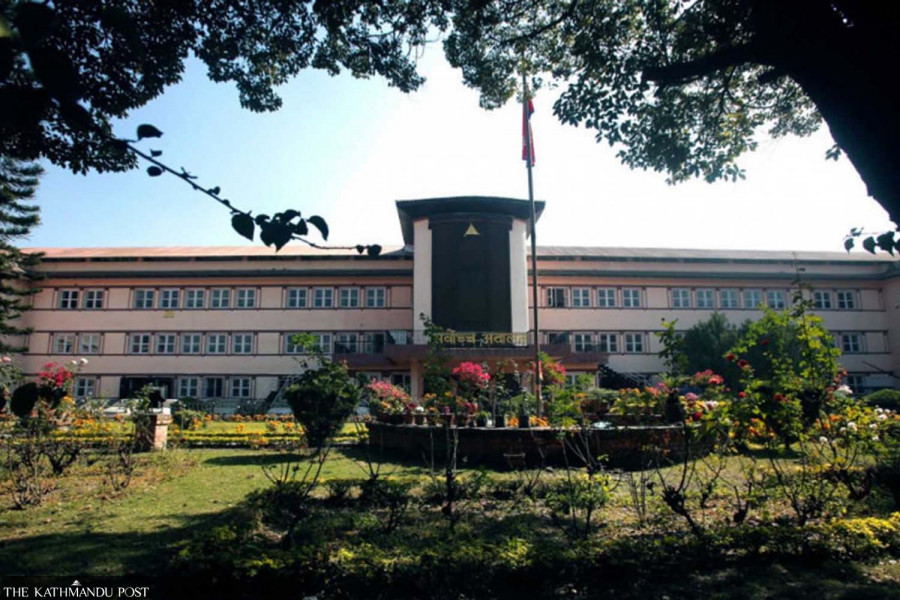National
Top court vacancies persist despite chief justice nomination
Positions of as many as five justices at Supreme Court, 42 judges at high courts and 40 judges at the district courts are currently lying vacant.
Binod Ghimire
The Constitutional Council on Monday nominated Hari Krishna Karki, the seniormost justice of the Supreme Court, for the chief justice role. He will be appointed after a parliamentary hearing.
The National Assembly has already nominated three members to the Parliamentary Hearing Committee, which will get a full shape once the House of Representatives names its representatives. The 15-member committee comprises 12 members from the House and three from the Assembly. Article 292 of the Constitution of Nepal makes parliamentary hearings mandatory for nominees for constitutional bodies.
In addition to the chief justice, the Supreme Court has four justice positions vacant. The chief justice’s position has been vacant since Cholendra Shumsher Rana was suspended after an impeachment motion was registered against him in the House on February 13 last year. The judiciary will get its leader after nearly a year and a half once Karki is appointed. However, the Supreme Court will still have five justice positions vacant.
As many as six justices retired on different dates in 2022. Just one justice—Til Prasad Shrestha—was appointed in March last year to replace Purushottam Bhandari. The court is yet to get replacements for former acting chief justice Deepak Kumar Kari and justices Meera Khadka, Tej Kumar KC and Bom Kumar Shrestha—all of whom retired last year.
The Judicial Council, on September 6 last year, recommended two High Court chief judges—Neeta Gautam-Dixit and Binod Sharma—and advocate DN Parajuli, who is also an associate professor of law and chief at Nepal Law Campus, for appointment as Supreme Court justices. Dixit and Sharma have since retired as chief judges.
Gautam-Dixit was chief judge of the Tulsipur High Court while Sharma led the Janakpur High Court. However, they couldn’t be appointed because the term of the House of Representatives expired before their hearings could take place. While the Constitutional Council led by the prime minister picks the chief justice, it is the Judicial Council that nominates justices for the Supreme Court and judges for lower courts.
Led by the chief justice, the five-member Judicial Council has the minister for law and justice, the senior-most justice of the Supreme Court, a jurist appointed by the President on the government’s recommendation, and a senior advocate recommended by the Nepal Bar Association, as members.
The formation of the hearing committee is the last leg of the judicial appointment process. However, it is uncertain whether it can conduct the hearing of the three September justice nominees.
“The decision on whether the committee can conduct the hearing of the three nominees will be taken when it gets a full shape,” Laxmi Gautam, joint-secretary at the Parliament Secretariat, who is also the secretary of the hearing committee, told the Post.
Officials at the Judicial Council say they are awaiting the response of the yet-to-be-formed hearing committee.
“The council has done its job by nominating the candidates. Now it is up to the hearing committee to decide whether it conducts the hearings,” Man Bahadur Karki, spokesperson for the Judicial Council, told the Post. “The council will take a position depending on the committee’s decision.”
In addition to five justices at the Supreme Court and 42 judges’ positions at High Courts, 40 judges’ positions in district courts are also vacant. Six high courts do not have chief judges. The meeting of the Judicial Council hasn’t been held for a long time in the absence of the law minister. The meeting is likely to be held this week with the appointment of Nepali Congress Vice-president Dhanraj Gurung as law minister on May 4. “As far as I know, the council’s meeting will be held this week. However, I cannot say whether it will make the recommendations or not,” said Karki, the spokesperson.




 13.12°C Kathmandu
13.12°C Kathmandu














